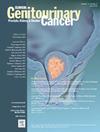免疫检查点抑制剂治疗晚期尿路上皮癌中FGFR2/3、MTAP或ERBB2基因组改变患者的临床结果
IF 2.3
3区 医学
Q3 ONCOLOGY
引用次数: 0
摘要
背景:FGFR2/3、MTAP和ERBB2基因组改变是晚期尿路上皮癌(aUC)的治疗靶点。这些改变可能会影响肿瘤微环境以及免疫检查点抑制剂(ICIs)在晚期尿路癌中的治疗效果:我们在接受 ICI 治疗的 aUC 患者的多机构队列中确定了具有可用基因组数据的患者。我们比较了FGFR 2/3、MTAP、ERBB2基因改变和未发生FGFR 2/3、MTAP、ERBB2基因改变的患者接受ICI治疗的结果(观察应答率[ORR]、无进展生存期和总生存期[PFS, OS])。我们使用逻辑回归法比较了ORR,使用Cox比例危险法比较了PFS/OS:在 1,514 例患者中,分别有 276 例(18%)、174 例(11%)和 208 例(14%)患者已知 FGFR2/3、MTAP 和 ERBB2 改变状态,并接受了 1L 或 2+L ICI 治疗。32%(OR 0.54;[95%CI 0.32-0.91]),FGFR2/3改变患者的PFS显著缩短(HR = 1.36 [95%CI 1.03-1.80];P=0.03);OS无显著差异(HR = 1.22 [95%CI 0.86-1.47])。在有MTAP改变(与没有MTAP改变)的患者中,ICI的ORR为25%对40%(OR 0.52 [95%CI 0.20-1.38]);PFS和OS无显著差异。在ERBB2改变(与无ERBB2改变)的患者中,使用ICI的ORR相似(37% vs. 35%; OR 1.06; 95%CI 0.57-1.97);ERBB2改变患者的PFS和OS显著延长[HR 0.63 (95%CI 0.41-0.95); P=0.03; HR 0.66, [95% CI 0.44-0.97]]:我们的研究结果支持进一步评估表皮生长因子受体2/3、MTAP和ERBB2的改变,将其作为接受ICI治疗的aUC患者的潜在生物标志物。本文章由计算机程序翻译,如有差异,请以英文原文为准。
Clinical Outcomes With Immune Checkpoint Inhibitors in Patients With FGFR2/3, MTAP or ERBB2 Genomic Alterations in Advanced Urothelial Carcinoma
Background
FGFR2/3, MTAP and ERBB2 genomic alterations have treatment targets in advanced urothelial carcinoma (aUC). These alterations may affect tumor microenvironment and outcomes with immune checkpoint inhibitors (ICIs) in aUC.
Patients and Methods
We identified patients with available genomic data in our multi-institution cohort of patients with aUC treated with ICI. Outcomes (observed response rate [ORR], progression-free and overall survival [PFS, OS]) with ICI were compared between patients with and without FGFR 2/3, MTAP, ERBB2 alterations. We compared ORR using logistic regression and PFS/OS using Cox proportional hazards.
Results
Out of 1,514 patients, 276 (18%), 174 (11%) and 208 (14%) patients had known FGFR2/3, MTAP and ERBB2 alteration status, respectively. and were treated with ICI in 1L or 2 + L. In patients with (vs. without) FGFR2/3 alteration, ORR with ICI was 21% vs. 32% (OR 0.54; [95%CI 0.32-0.91]), PFS was significantly shorter in patients with FGFR2/3 alterations (HR = 1.36 [95%CI 1.03-1.80]; P=0.03); OS was not significantly different (HR = 1.22 [95%CI 0.86-1.47]). In patients with (vs. without) MTAP alteration, ORR with ICI was 25% versus 40% (OR 0.52 [95%CI 0.20-1.38]); PFS and OS were nonsignificantly different. In patients with (vs. without) ERBB2 alteration, ORR with ICI was similar (37% vs. 35%; OR 1.06; 95%CI 0.57-1.97); PFS and OS were significantly longer in patients with ERBB2 alteration [HR 0.63 (95%CI 0.41-0.95); P=0.03; HR 0.66, [95% CI 0.44-0.97]), respectively.
Conclusion
Our results support further evaluation of FGFR2/3, MTAP and ERBB2 alterations as putative biomarkers in patients with aUC treated with ICI.
求助全文
通过发布文献求助,成功后即可免费获取论文全文。
去求助
来源期刊

Clinical genitourinary cancer
医学-泌尿学与肾脏学
CiteScore
5.20
自引率
6.20%
发文量
201
审稿时长
54 days
期刊介绍:
Clinical Genitourinary Cancer is a peer-reviewed journal that publishes original articles describing various aspects of clinical and translational research in genitourinary cancers. Clinical Genitourinary Cancer is devoted to articles on detection, diagnosis, prevention, and treatment of genitourinary cancers. The main emphasis is on recent scientific developments in all areas related to genitourinary malignancies. Specific areas of interest include clinical research and mechanistic approaches; drug sensitivity and resistance; gene and antisense therapy; pathology, markers, and prognostic indicators; chemoprevention strategies; multimodality therapy; and integration of various approaches.
 求助内容:
求助内容: 应助结果提醒方式:
应助结果提醒方式:


